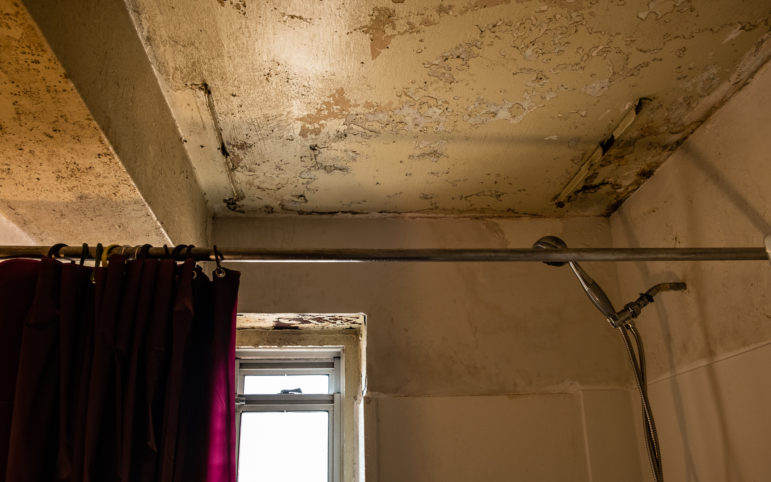The City Council’s resolution implores the state legislature and HUD to “take strong action and increase NYCHA accountability by auditing the responsiveness of NYCHA managers to tenants,” citing complaints from residents about work orders languishing or getting closed without an actual fix.

Adi Talwar
Water damage in an apartment at NYCHA’s Red Hook West Houses in 2022.
New York City lawmakers are calling for stronger oversight of how NYCHA handles tenants’ repair requests, citing complaints from residents about work orders languishing or getting closed without an actual fix.
On Thursday, the City Council passed Resolution No. 68, which implores the state legislature and U.S. Department of Housing and Urban Development (HUD) to “take strong action and increase NYCHA accountability by auditing the responsiveness of NYCHA managers to tenants.”
Councilmember Ari Kagan, who sponsored the resolution, said it was spurred by his experiences helping tenants in his south Brooklyn district—which includes the Coney Island and Marlboro Houses—with problems like mold, leaks, broken elevators or heat and hot water outages.
“Their complaints, phone calls, emails were completely ignored,” the councilman said ahead of a public housing committee vote on the resolution, which he introduced last year.
“The time for excuses is over. Someone has to act, someone has to check apartments, someone has to visit,” he added. “It shouldn’t take Councilmember Ari Kagan a year of begging.”
As of September, NYCHA had nearly 597,000 open work orders across the system. While that’s down 7 percent from the year before, the housing authority says it still has more than $78 billion in capital repair needs, the result of decades of government underfunding. In September, the average time it took for NYCHA to complete repairs was 367 days; the target is 15 days.
Neither HUD nor reps for the State Legislature returned requests for comment on the resolution, which the Council adopted unanimously Thursday. A NYCHA spokesperson declined to comment. But at a hearing in June of 2022, NYCHA Chief Operating Officer Eva Trimble pointed to the housing authority’s significant repair needs as fueling residents’ frustrations.
“The fact that our buildings are so old, we could go in there today and fix a pipe, and tomorrow a pipe may burst somewhere else. So we are trying to do our best to improve our operations to address how we respond to those work orders, but without significant capital, it will be very hard for us to completely reduce that backlog,” Trimble told lawmakers at the time.
NYCHA has pitched two major initiatives, PACT and the Preservation Trust, as avenues for funding some of those repairs. Trimble also pointed to the authority’s Work Order Reform plan, rolled out across the city in 2022, to improve the process by adding 450 “skilled trades” maintenance workers to NYCHA staff, as well as “neighborhood planners” to serve as the point of contact for repairs in a given neighborhood.
“Right now, we admit that a lot of our repairs are scheduled without any resident interaction, which doesn’t ensure a positive outcome,” Trimble told councilmembers last year. “I can’t guarantee the pipe won’t burst again, but what I’m trying to guarantee is that we will show up when we say we’re going to show up, and that we’re going to do our best to fix the repair at that time.”
While a law passed last year now allows NYCHA tenants to lodge their maintenance requests through the city’s 311 system, their complaints are still routed back to the housing authority’s Customer Contact Center.
RELATED READING: Under New Law, NYCHA Tenants Can Log Maintenance Complaints with 311. But Advocates Want More Substantial Changes
By contrast, 311 complaints from tenants in privately-owned buildings can trigger an inspection from the city’s Department of Buildings or Housing Preservation and Development (HPD)—what advocates say is a more effective route, but which requires a Housing Court order for NYCHA tenants.
“When tenants’ complaints are investigated by HPD, we do see results,” Ross Joy, director of housing and civil justice at the Red Hook Community Justice Center, testified at last year’s Council hearing. “It gives tenants more direct, independent power to back up their claims. When you say you don’t have gas, you can get a housing code violation with it being cited.”
The Council’s newly-passed resolution seeks out other avenues of accountability: It urges Albany and HUD to institute penalties—like fines and docked vacation time—if NYCHA management fails to address repeat issues within a six-month period, including against staffers who close out work orders without doing the work.
“I hope this really lets NYCHA know that we will be watching,” Councilmember Darlene Mealy said Thursday when voting in favor of the resolution. “The city is watching, and NYCHA residents deserve and demand respect.”
To reach the reporter behind this story, contact Jeanmarie@citylimits.flywheelstaging.com.








